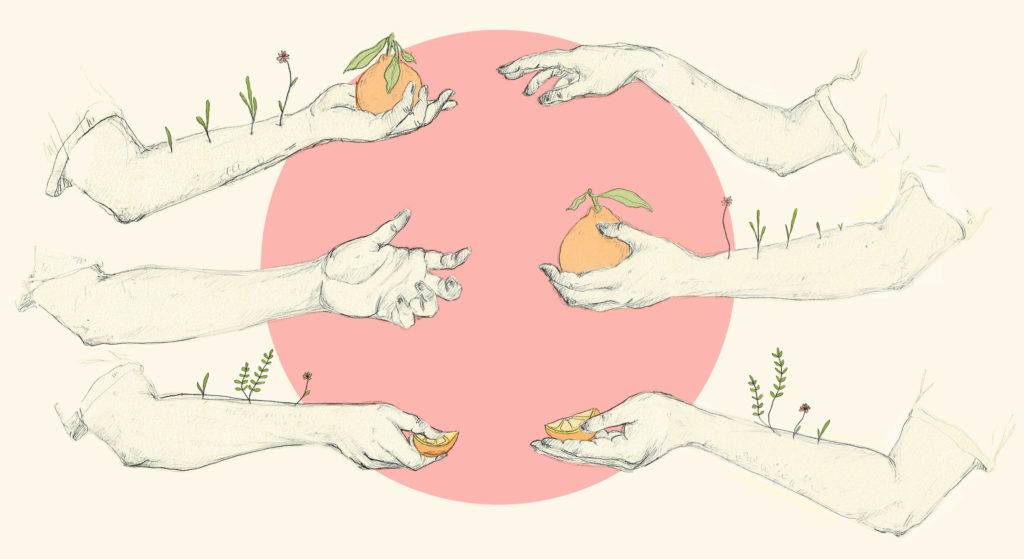Continuing with our collaborative self-love blog series, Psychology/Behavioral Science PHD student Ali Szarko has sent some new content helping us reflect on our current circumstances during the COVID-19 crisis and healthy ways to adapt and take care for numero uno. Accompanying this post, artwork by our dear friend and local artist Adam Benedict. Read Ali’s post below.

Are Your Actions Nourishing or Depleting Your Well-being?
• Identify the self-care habits you can practice habitually at home. Then practice them with complete focused attention. If you can afford to, practice slowing down your actions and fully coming into contact with as much of the experience as possible (i.e., “mindful” engagement).
• Here are some examples of actions that can be practiced mindfully at home: stretching, exercise, cooking, eating, cleaning, showering, listening to music, creating a piece of art, gardening, a neighborhood stroll or bicycle ride, interacting with a pet, or simply walking around your house and noticing the sights, sounds, and tactile sensations of your home. (Each of us has unique preferences. What may feel like self-care for one person, may feel like complete agony for another. The above list is by no means complete. Some of the activities listed above may not function as self-care for you and that is completely okay.)
• There is also no pressure to be “in the moment” at all times. It is normal and expected that your mind will wander between thoughts of the past, thoughts of the future, and thoughts of the present. If you notice you have psychologically traveled to a past memory or to a potential future event, just gently acknowledge that this happened and compassionately bring yourself back to the moment by attending to your five-sense experiences. Like any other skill, mindfulness can never be perfected and there is always room for growth and refinement.
• If you’re struggling to identify when an action is in service of self-care, you can ask yourself the following question while you’re engaging in that activity:
“In this moment, does this action feel nourishing or depleting to my overall well-being?”
• If the answer is “yes”, then congratulations! You’ve identified a practice that brings you a greater sense of vitality and is likely tied to your core values.
• If the answer is “no”, that is perfectly okay! You’re a learning, breathing, human thing that is trying their best. Now you know what isn’t serving you and you can use this moment to identify how to pivot back toward a direction more in alignment with your personal values–toward the actions that feel the most nourishing.
Self Love is Self Defined
For each post, we ask one self-love thinker what self-love means to them. This month, we asked Amy O’Brien, MSW. Amy is a practicing social worker and mindfulness enthusiast with an ever-evolving interest in connective ways of being. Here are their thoughts:
“To me, self-love is an acquired practice that ebbs and flows in different ways to sustain and enrich a person through life’s many meanderings. Self-love is flexible, creative, and forgiving. It starts with noticing what helps one’s well-being thrive and then doing more of those things regularly, ritually, and randomly.
I feel most “self-loving” when I am attuned to my needs and when I take action to get them met. This hasn’t always been easy for me; I had to purposefully learn to be present and pay attention to my inner dialogue and internal conflicts. This awareness began with mindful practices like yoga and meditation and truly transformed through EMDR and parts work so that now it’s much easier to quickly check in with myself in the moment to get what I need in a way that honors my values. New experiences and challenges inspire reflection, recalibration, and restoration. Each bend in the river is another opportunity to align with my core values, tend to my inner self, and embody an ethic of love for myself and others.”
To learn more about the Holland Project Self Love Series, you can follow @globalselfloveclub on Instagram. Read more in this series.
